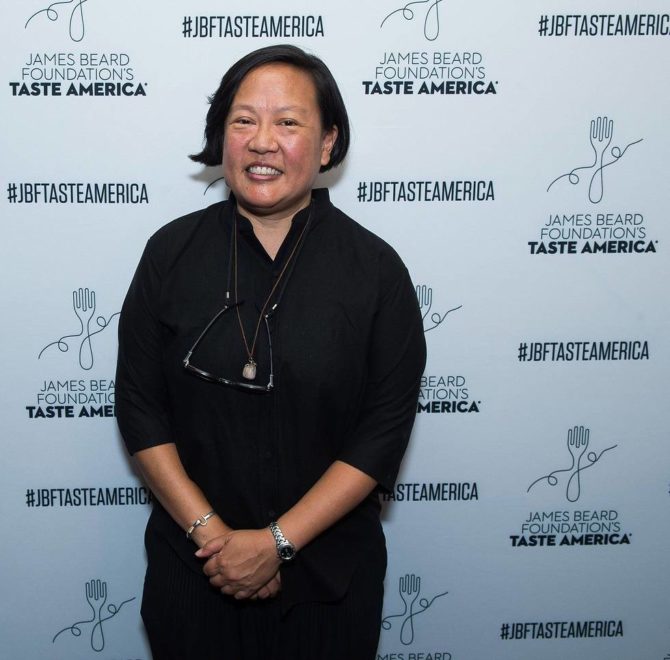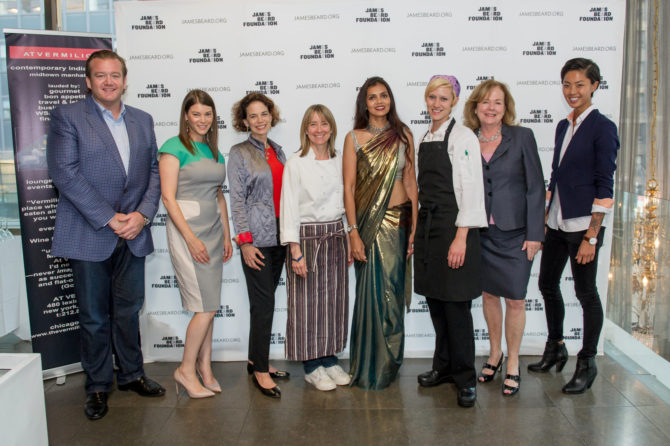There’s no arguing that women make up a critically significant part of the food industry (a majority in fact, according to the Bureau of Labor Statistics), but the number of women who actually run kitchens (even if they own a restaurant) is slimmer than you’d imagine. Despite an abundance of promising statistics, challenges still face the food industry’s progression towards gender equality. But why? And is anyone doing anything about it?
“I still think it’s a lot harder for women to get recognition outside of the female category,” said NYC chef Anita Lo at the James Beard Foundation’s Taste America cook-off in August. Anita worked in renowned restaurants such as Maxim’s and Bouley in the late 80’s and early 90’s. Her own restaurant, Annisa, opened in 2000 and features of wine list of bottles made by female vitners or owners. Anita is one of the all-star chefs participating in JBF’s Taste America tour this fall.

Photo by Charles Sykes/Invision for James Beard Foundation/AP Images
The James Beard Foundation is one of several organizations trying to reduce such persistent inequality through their Women in Culinary Leadership program. WICL, which began in 2012, pairs female grantees with experienced mentors for a period of six or twelve months. Recipients include not only chefs, but also individuals interested in front-of-house and back-of-house management.
According to JBF’s Manager of Special Projects and Student Programs, Shelley Menaged, the program hopes to “fast-track the learning and building of the many in-depth skills required to run a successful business.” Women in Culinary Leadership currently enrolls 21 participants. JBF hopes to develop further program infrastructure so that its outreach can expand.

Photo by Ken Goodman/James Beard Foundation
The program is so impactful, that mentors have found the experience just as beneficial as mentees have. It is perhaps due to this enthusiasm that the program has grown from seven to nearly triple that, in just two years. Can someone say girl power?
“I see that things have gotten better but the culture takes a really long time to change,” Lo added.
I asked JBF’s Shelley Menaged, to discuss Women in Culinary Leadership and women in the food world at large.
What inspired the creation of this program?
SM: With the continued growth of the culinary and hospitality industry, we have found that even today, women are still being passed over for promotions, leadership, and business opportunities. This program we hope will fast track the learning and building of the many in-depth skills required to run a successful business.
How has gender imbalance in the food industry changed over the past decade?
SM: When several of our mentors first started in the industry, there were very limited quotas of women accepted to culinary schools, and were often the sole female working in their kitchens. In 2011, as reported by the NRA, 50% of restaurants were owned by women. As of the past few years, women make up around 50% of all culinary students, up from about one third of the student body in 2000. I have read reports that many of the nation’s successful and well-run restaurant groups employ no less than 30 and up to 50% women. With the numbers such as these, still only 7% of women actually run kitchens as head chefs.
What impact does this program have on its recipients?
SM: This program can provide a profound change in the recipients’ life if they embrace all that it has to offer. Besides improving culinary, management, and basic business skills, this mentorship more often than not, offers up personal growth along with the confidence needed to foster success.
Why are mentorships important?
SM: Developing one-on-one teaching/learning relationships—or in most cases here working side by side with the many talented managers in the organization—coupled with regularly scheduled meetings (that offer feedback), is a most effective way to create an enhanced learning experience.
What does JBF look for in a recipient?
SM: Someone with a passion for the hospitality industry, willing to dedicate their time and energy towards learning and doing their best to succeed. That’s an ideal candidate.
What does JBF look for in a mentor?
SM: A chef and or restaurateur who is willing to dedicate their company’s time and resources to offer up a hands-on learning experience, coupled with the understanding that open and constant communication is also a key in the process. Mentors have shared with us that this experience has had a positive effect on them, almost as much as it has had on their mentees.
What other efforts have you seen made to reduce gender imbalance in the food industry? Have those efforts affected JBF and WICL?
SM: I find that like-minded organizations are a very effective way to address this imbalance. Les Dames d’Escoffier International was formed in 1976, and was one of the founding women’s culinary organizations. Formed in 1981, the New York Women’s Culinary Alliance followed shortly thereafter. Both organizations are dedicated to the education, networking, and philanthropy, of and for women in the food, beverage, and hospitality industry. In 1993 Women Chefs & Restaurateurs came to be, bringing together a specific group of women in the industry. Over the past few years several new women’s groups (i.e. Cherry Bombe and Toklas Society) have been formed offering additional and varied support. Full disclosure, I am a Dames and a long time and past board member of NYWCA.
How quickly is this popular program expanding?
SM: The program started with one mentor, to seven the next year, then to almost triple in the third year. While we would love to continue to expand this opportunity to many more women, the program’s infrastructure needs to be developed a bit more to support additional growth. We are working on that now.
What kind of results have you seen come out of WICL?
SM: I am pleased to say that the eight graduates of the program have all been offered positions from their mentors. While only a few accepted, all are gainfully employed working in positions that offer growth and leadership potential.


